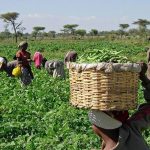The National Agricultural Land Development Authority has announced a new greenhouse farming programme aimed at ending seasonal reliance on vegetable production while empowering young agripreneurs and women farmers across Nigeria. The initiative, approved by the presidency, is designed to create controlled agricultural hubs that guarantee constant supply of tomatoes, peppers, avocados and leafy vegetables, ultimately improving market stability and reducing post-harvest losses.
During an inspection of the greenhouse hub at the University of Abuja, NALDA’s executive secretary said the project will be delivered in phases to achieve sustainable output rather than seasonal harvests. Three high-tech, temperature-controlled greenhouse clusters will be built across key agricultural zones, alongside net-house facilities in Abuja and Ogun State. The Abuja site in Giri houses 20 greenhouses and a nursery, while Shagamu in Ogun State has 30 units, each equipped with packing houses, cold storage and solar systems to reduce operational costs.
The facilities are strategically positioned to serve major consumption markets such as Abuja and Lagos, cutting transportation expenses and supporting small agribusinesses that struggle with logistics. NALDA is also assisting existing greenhouse operators in Shagamu and Epe to boost their production capacity through infrastructure support.
A key feature of the programme is youth agripreneurship. Young farmers will independently manage allocated net houses under NALDA supervision, transitioning them from subsistence growers to commercial producers with access to premium markets. At least ten youths are to operate the first 20 units in Abuja, with expansion to 50 greenhouses planned in Abuja and Shagamu.
Women farmers are also being integrated through open-field vegetable schemes, with at least ten hectares per federal constituency earmarked for crops including peppers, tomatoes and greens. Pilot preparations are already underway in Cross River, Taraba, Plateau and Gombe States, where land clearing and irrigation installations have begun.
The Abuja facility is expected to be fully operational by December 2025, with other locations scheduled to follow in early 2026. NALDA clarified that the programme is an empowerment initiative, not a loan scheme, removing infrastructure barriers preventing smallholder farmers from scaling up.
Beyond food supply, the greenhouse clusters are expected to influence price stability through coordinated harvesting and offtake planning, preventing glut and scarcity cycles that hurt micro and small food businesses. With steady year-round supply, urban food vendors, small retailers and agro-processors could gain more reliable access to produce.
According to NALDA, greenhouse farming under this model remains fully organic, utilising controlled atmospheric conditions rather than chemical intervention. The agency appealed to state governments and communities for additional land to scale the model nationwide, reinforcing its goal to decentralise food production and promote urban agriculture near major markets.
“Our priority is to provide the environment for agriculture to thrive. Once the infrastructure is there, farmers and agribusinesses will do the rest,” NALDA emphasised, noting that universities and agricultural institutions will collaborate in training interested youths under the scheme.










